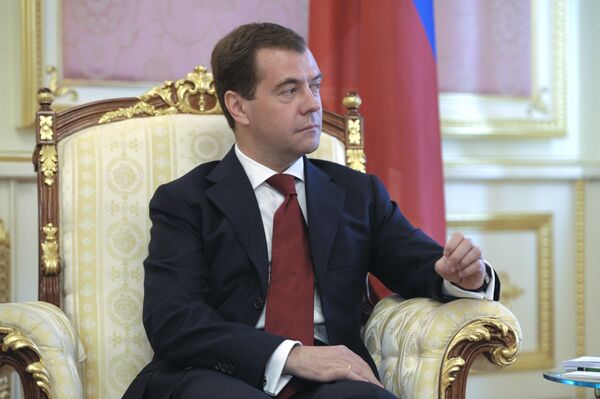Russian President Dmitry Medvedev said on Monday he was determined to question his Brazilian counterpart about the details of a nuclear fuel swap deal with Iran.
The Iranian, Brazilian, and Turkish foreign ministers signed an agreement earlier on Monday on the exchange of low-enriched uranium to fuel Tehran's scientific research reactor.
"I hope to have a telephone conversation with my friend and colleague Luiz Lula da Silva, the president of Brazil, this evening. I hope to receive firsthand information," Medvedev said.
He added that the new agreements with Iran could require additional consultations.
"Urgent consultations are needed with the participation of all parties involved, including Iran," he said.
Iran, which has recently been under international pressure to halt uranium enrichment, agreed to swap in Turkey most of its 3.5%-enriched uranium for 20%-enriched fuel for use in its Tehran scientific research reactor.
He said it was not clear how much uranium Iran would exchange.
"The question is whether the amount of exchange operations will be sufficient and satisfy all members of the international community," Medvedev said.
He also expressed concern about Iran's intentions to continue the enrichment process.
"Judging by statements made by some Iranian officials, Iran will continue such work. If that is indeed the case, naturally, the international community's concerns could remain," he said.
The United States and other Western countries suspect Iran of developing nuclear weapons under the guise of a civilian nuclear energy program and are seeking new sanctions following Iran's move to enrich uranium to 20%.
The Iran Six (France, Britain, Germany, the United States, Russia and China) began on April 19 discussing the text of a draft resolution to impose sanctions on the Islamic Republic.
The German government said on Monday the deal between Iran and the UN's nuclear watchdog, the IAEA, on the nuclear program "cannot be replaced by an accord with other countries."
A spokesman for EU foreign policy chief Catherine Ashton told AFP that the nuclear fuel swap deal "does not answer all of the concerns" raised by Tehran's nuclear program, although it is a "move in the right direction."
KIEV, May 17 (RIA Novosti)


